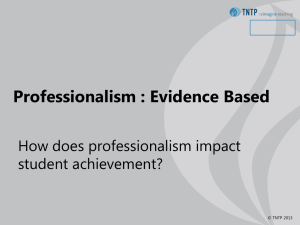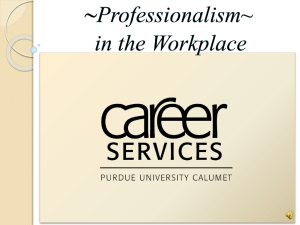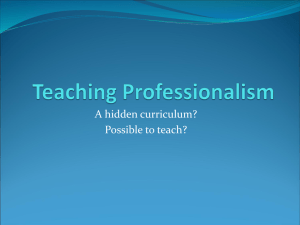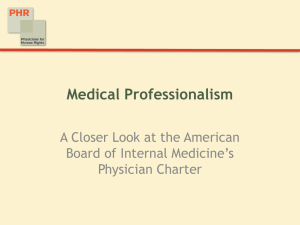NOBC Law School Professionalism Initiative Report
advertisement
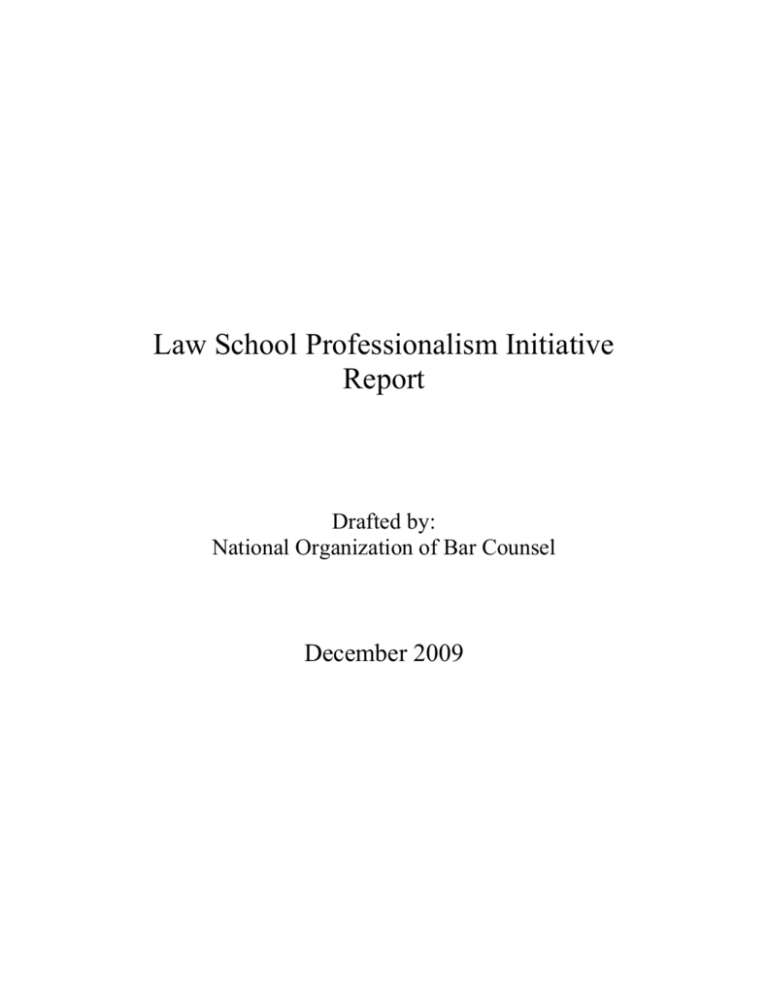
Law School Professionalism Initiative Report Drafted by: National Organization of Bar Counsel December 2009 NOBC Law School Professionalism Initiative Committee 2009 John T. Berry, Chair Tallahassee, Florida Sally E. Scott-Mullins Albuquerque, New Mexico Paul J. Burgoyne Philadelphia, Pennsylvania James J. Grogan Chicago, Illinois Donald R. Lundberg Indianapolis, Indiana Lawrence Bloom Washington, D.C. Carl J. Zahner Tallahassee, Florida TABLE OF CONTENTS Page I. Introduction...................................................................................... 1 II. Classroom Criteria 4 Teaching Professionalism ...............................................................................4 Pervasive Training ..........................................................................................6 Practice Management Course .........................................................................7 Skills Training and Leadership Courses .........................................................9 Clinical Training and Externships ................................................................11 III. Student Accountability and Law School Environment 12 Personal Well-Being and Morality ...............................................................12 Conduct and Honor Codes ............................................................................14 Remediation Programs ..................................................................................16 Character and Fitness Information ................................................................17 Diversity........................................................................................................18 Faculty Credentials .......................................................................................19 Resources Devoted to Dean of Student Affairs ............................................20 IV. External Contacts and Influence 21 Mentoring ......................................................................................................21 Bar Associations, Legal Community and Pro Bono Programs .....................22 Learning Outcomes Through Surveys of Alumni and Employers................24 V. Conclusion 24 1 NOBC Law School Professionalism Initiative Report I. INTRODUCTION The National Organization of Bar Counsel (hereinafter “NOBC”) is a professional association of agencies and lawyers engaged in lawyer discipline and regulation through the enforcement of legal ethics rules. Members of NOBC are also actively engaged in educational, preventive and rehabilitative efforts impacting lawyer ethics and professionalism. In 2008, President Dawn Evans appointed an NOBC committee to study, consider and report on suggested methods for improving the development of professionalism and professional identities in the law school experience. The report which follows is the product of that committee’s work. The premise of the NOBC Law School Professionalism Initiative Report (hereinafter “NOBC Report”) is that law schools should do more to incorporate ethics, professionalism and the development of a professional identity into all aspects of academic life. The NOBC Report is a recommendation for the evolution of legal education to better prepare law students to be professionals. The term “legal ethics” refers to compliance with applicable professional conduct rules patterned after the ABA Model Rules of Professional Conduct. Professionalism and professional identity are more difficult concepts to define, since they are based on historical and aspirational views of the role of lawyers in society. For purposes of this report, we adopt the view of professional identity and purpose as set forth in Chapter 4 of Sullivan, et al., “Educating Lawyers: Preparation for the Profession of Law” (The Carnegie Foundation for the Advancement of Teaching 2007; hereinafter “Carnegie Report”). A non-exclusive list of the professional traits that 1 law schools should promote includes: competence, knowledge, skill, honesty, trustworthiness, reliability, respect for legal obligations, responsibility, civility in dealings with others, personal integrity, and empathy. Professional identity also includes a commitment to and respect for the administration of justice, the institutions of the law, and public service in general. In 2008, The American Bar Association Outcome Measures Committee recommended that law schools adopt an accreditation model reducing reliance on input measurements in favor of increased emphasis on outcome measurements. (ABA Outcome Measures Committee Report, 2008, p. 2) The NOBC Report posits that the law school accreditation process should require schools to submit plans for the development of professionalism and professional identity in their students, including detailed and concrete goals and measurements. Such plans would assist law schools in assessing their success in improving the preparation of law students for the practice of law and assist students and families in selecting a law school. In addition, these plans would provide a foundation for future research into the comparative merit of various approaches to the process of developing legal professionals who are better equipped to meet the professionalism and ethical challenges inherent in the practice of law. The NOBC Report includes concrete examples of the criteria that could be included in a law school’s plan to satisfy the accreditation recommendations of both the Carnegie Report and the ABA Outcome Measures Committee Report. It is not intended to suggest exclusive forms of measurement; flexibility is essential in this evolutionary 2 process. There is ample room for each school to address its mission through a broad range of innovations, reform and creativity. Law schools should develop professionalism plans that address all three apprenticeships of the Carnegie Report: legal analysis, practical skill and professional identity. These plans should not only include specific goals for achieving competency in all three spheres, but also include methods for measuring both inputs and outcomes in order to assess progress toward achievement of those goals. Professionalism plans, as a clear articulation of an institution’s educational values, will be a valuable tool to help prospective students differentiate among schools, allow schools to conduct on-going selfassessment of the efficacy of their educational enterprise, and provide a basis for scholarly study of effectiveness in legal education. Law school professionalism plans will also be an important assessment tool in the accreditation process, but not to the exclusion of their value as internal guides for continuous improvement in the quality of legal education. A school’s plan for achieving the goal of instilling professional values and identity in its students should go beyond curriculum and extend to tracking student behavior, remediation of students with observed and demonstrated problems and holding students accountable for their behavior in the law school environment. The NOBC Report primarily addresses the third apprenticeship set forth in the Carnegie Report, the inculcation and refinement of professional values in law students. The report is divided into three broad categories of ways in which law schools impact professionalism and ethics. The categories are Classroom Criteria, Student Accountability and Law School Environment, and External Contacts and Influence. Criteria law schools could use in accreditation and professionalism plans, along with 3 suggested input and outcome measurements, are set forth in the report. There may not be agreement on specific proposals. The critical emphasis of the report is that all law schools should develop professionalism plans reflecting specific criteria and measurements for instilling professional values in their students. II. CLASSROOM CRITERIA TEACHING PROFESSIONALISM NOBC believes that professionalism themes must be emphasized throughout the law school environment. The critical role that lawyers play in American culture and society requires that students, throughout the course of their law school training, learn about the responsibilities a legal professional owes to the profession, the public, the courts, and the bar. It is imperative that law students understand the myriad of ways in which ethical and professional issues can arise in substantive areas of the law. Schools should require that all students receive comprehensive instruction in professionalism, in addition to traditional ethics courses. Schools should also require that pervasive teaching methods are utilized throughout the curriculum. Additionally, students should encounter professionalism themes at two significant junctures in their law school career. First, students should be introduced to the concept of professionalism upon their entry into law school. Ideally, law schools should offer a mandatory orientation program prior to the beginning of first-year classes that would introduce students to the concept of what it means to be a professional. In sessions using panel discussions, hypothetical problems, or role-playing, students should encounter the themes of fiduciary duties, collegiality, advocacy, limitations on conduct, and the ramifications of making decisions and taking action in the course of representing a client. Students 4 should also learn the importance of achieving and maintaining a reputation in their community for reputable and competent practice, as well as the consequences of failing to do so. Second, exit workshops should be conducted with all graduating law school students. The exit workshops should take the themes that were introduced at the initial orientation and determine how student views or concepts may have changed in the intervening years. Panel discussions with active practitioners and judges would be helpful at this stage. Exit workshops would not only serve to re-focus students on the professional and ethical responsibilities of practicing lawyers, but also would provide valuable feedback to the school on the success of its efforts to prepare students to succeed in the practice of law. SUGGESTED MEASUREMENTS: Does the school require mandatory instruction in professionalism in addition to ethics instruction? Is the format of professionalism instruction a separate course, a component of the ethics course or a seminar? Is completion of the professionalism course or seminar required? If the course or seminar is not required, what does the school do to encourage participation? What percentage of students completes the professionalism course or seminar? 5 PERVASIVE TRAINING Perhaps the single most important component in cultivating an understanding of professional responsibility and professionalism concepts in prospective lawyers is the pervasive method of training in law school. No law school subject should be taught in isolation. NOBC believes that an approach based solely on academic theory, without regard to real world issues which arise in the practice, actually harms law students by providing them with an incomplete and unrealistic perspective of the profession they will soon enter. For example, the presentation in a criminal procedure class of the disclosure requirements mandated by Brady v. Maryland, 373 U.S. 83, 83 S.Ct. 1194 (1963), should address the potential ramifications of a prosecutor’s noncompliance. Simply stated, law students need to know the repercussions of lawyer misconduct within the context of the substantive law they are learning in the academic environment. Some law schools are now promoting pervasive training, and such schools should be commended for their efforts. It is vital, however, that all law schools have, as an essential element of their respective institution’s mission statement, a provision that reflects that their law students will be able to adequately and competently address ethical and professionalism issues upon graduation and subsequent admission to the bar. Pervasive training will require that teachers move beyond instructing students solely on the course topic at hand. Dynamic and innovative alternatives for incorporating instruction on ethical and professionalism issues relevant to the substantive topic should be developed by faculty. SUGGESTED MEASUREMENTS: Are faculty members required to demonstrate pervasive instruction in each course syllabus? 6 Are faculty members encouraged to demonstrate pervasive instruction in each course syllabus? If not required to include pervasive instruction methodology in course syllabi, what percentage of course syllabi contains this information? What does the school do to instruct and assist faculty members to utilize pervasive training techniques? What does the school do to insure its faculty is utilizing pervasive teaching techniques to instruct students on professionalism in substantive law courses? PRACTICE MANAGEMENT COURSE A practice management course should be developed and strongly encouraged as a component of the final year of study. Similar to trial practice and appellate advocacy, this would be a course that addresses practical skills. Instead of focusing on a lawyer’s interaction with courts as do the former two courses, a practice management course would center on a lawyer’s dealings with clients and provide a working knowledge of the fundamentals of prioritizing and managing a law practice caseload and operating a law business. The course would provide an important step in ensuring that more competent future professionals enter the field upon graduation and admission to the bar. The course could be offered on a week long-intensive basis or be held once a week throughout an entire semester. Utilizing faculty instructors, legal professionals, and other professionals, such as human resource managers and accountants, the course should provide instruction regarding the following non-exhaustive list of topics: advertising and marketing; file organization; calendaring; document management; billing considerations; malpractice 7 insurance concerns; client relations; trust account management; recordkeeping and trust account software; and the supervision of subordinates. The course should correlate instruction in these pragmatic skills with the applicable provisions of the jurisdiction’s rules of professional conduct. For example, instruction on file organization, calendaring, and document management implicate Model Rules of Professional Conduct 1.1 (competence); 1.3 (promptness and diligence); 1.6 (confidentiality); and 1.15 (safekeeping property). Supervision of subordinates should be taught with reference to the jurisdiction’s equivalent of Model Rules 5.1 (responsibilities of partners, managers and supervisory lawyers); 5.2 (responsibilities of subordinate lawyer); 5.3 (responsibilities regarding nonlawyer assistants); and 5.4 (professional independence of lawyer). Incorporating relevant code or rule provisions into the practice management curriculum will not only introduce the students to the guidance provided in the rules and comments, but also expose them to the real life consequences of not properly managing a law practice. NOBC recommends that the course also be made available to alumni of the relevant law school as well as to other practitioners in the locale who might have an interest in learning management skills. A review of disciplinary statistics will amply demonstrate the negative impact on practicing law which can result from not providing law students with this practical knowledge. SUGGESTED MEASUREMENTS: Does the law school provide practice management skills instruction? Is the format a separate course, a component of a professionalism course, or a seminar? Is the course mandatory or voluntary? 8 If voluntary, what percentage of students takes the course? What does the school do to emphasize the importance of practice management skills instruction? What practice management materials are provided to students? SKILLS TRAINING AND LEADERSHIP COURSES NOBC believes that skills training and skills-based courses provide significant advantages to students who intend to practice law after graduation. Law schools should maximize academic opportunities that emphasize skills training. In addition to trial and appellate practice courses that appeal to students interested in litigation, schools should offer skills-based subjects that track certain substantive courses. For example, students interested in labor and employment or domestic relations law should be offered skillsbased courses in negotiation strategies and alternate dispute resolution. Similarly, students who want to practice real estate law should be able take a skills course on closing practices and title insurance issues. Students who intend to practice transactional law should be exposed to pragmatic issues and solutions from professionals who practice in that field. All students should have an opportunity to be trained in client counseling, especially to learn techniques for counseling clients who have unjustified, unrealistic, or impractical notions of what they may gain by employing the lawyer’s services. A number of schools provide a class that focuses on the leadership aspects of being a lawyer. Some of the following themes are stressed during a course of this nature: character and integrity, motivational skills, interpersonal skills, management of people, negotiating and compromise skills. While supportive of such an approach, NOBC 9 believes that the goals sought by offering such a course would be better achieved either through pervasive training or as part of skills-based training. SUGGESTED MEASUREMENTS: What legal skills training courses or seminars are available? What is the format of the legal skills training courses? Are skills training instructors offered tenure opportunities? If skills instructors are not offered tenure, what contractual or other incentives are offered to recognize the importance of skills instruction? Are outside “experts” utilized to instruct in legal skills training? What percentage of students receives skills training? Does the school conduct surveys of its former students to determine the impact of its skills training and leadership courses? Does the school offer courses focusing on the leadership responsibilities of lawyers? What percentage of the school’s students takes the leadership course? Has the school developed a syllabus outlining the areas covered in the leadership course? Does the school conduct exit surveys to determine the value of the leadership course to students who complete it? Does the school’s pervasive teaching of ethics and professionalism in other courses incorporate instruction on the leadership aspects and responsibilities inherent in the practice of law? 10 CLINICAL TRAINING AND EXTERNSHIPS Students should have the opportunity to learn practical skills and to interact with clients, colleagues, tribunals, and others in a clinical training environment. To provide good clinical training, however, law schools must hire experienced and talented clinical staff, with tenure opportunities, to instruct and mentor students. Clinical training experiences should not be limited to legal-aid type situations. Instead, a wide spectrum of programs should be offered. Law schools should foster mentoring programs as part of the clinical training experience. Experienced alumni, especially senior lawyers, can provide a helpful link between academia and the profession. Law schools should have viable internship and clerking programs that allow students to view how the practice of law is conducted in a real world setting. NOBC recommends that law schools offer externship programs and clinics for credit in various areas of the law, including the area of legal ethics by working at the local office of bar counsel. SUGGESTED MEASUREMENTS: Does the school make externship and clinical programs available to its students? Are these programs mandatory or voluntary? Does the school involve local bar associations and legal community in the development of externship and clinical programs? For what percentage of students do clinical training opportunities exist? What percentage of clinical training opportunities is filled each year? What does the school do to encourage student participation in clinical training opportunities? 11 Are tenure opportunities available to clinical training instructors? Are alumni or local attorneys utilized to mentor students in clinical training programs? III. STUDENT ACCOUNTABILITY AND LAW SCHOOL ENVIRONMENT PERSONAL WELL-BEING AND MORALITY Law schools should provide mechanisms for students to become aware of the pressures of law school and the adjustments that are necessary to cope successfully with the practice of law. Knowing the realities of practice and having opportunities to experience them will greatly assist students in deciding what type of practice is best for each. The incidence of depression, other mental health problems, substance abuse and chemical dependency is significantly higher in the bar than in the general population. The legal education experience and the subsequent challenges of practicing law do not ameliorate these problems and often exacerbate them. Beyond formally diagnosable conditions, the law school environment often presents other challenges to personal wellbeing, including stress, social isolation and loss of commitment to personal values. Law schools should be aware of the potentially debilitating effects of legal education on mental health, well-being and commitment to personal values; and they should create programs that address and counteract those effects. Law schools should allocate resources to detect students who manifest problems with personal well-being and to intervene, ideally before those problems become debilitating or otherwise counterproductive to the law school learning environment. Law schools should strive to foster a culture that empowers students to be guided by their own moral compasses in addressing 12 the professionalism and ethical challenges they face in law school and will face in the practice of law. Emphasis on engagement, teamwork and collaboration is necessary to fight the tendency of law students to be self-protective or self-interested to the point of unhealthy isolation or anti-social conduct directed toward other students. Law schools should teach resiliency and coping skills that will assist students to develop personal resources to deal in healthy ways with the challenges that accompany the practice of law. It is of particular importance that law schools respect the moral values that students bring with them and aid them in the healthy integration of their moral selves with their future roles as agents for clients who may have radically different values. SUGGESTED MEASUREMENTS: Does the school require that course syllabi demonstrate use of collaborative assignments and shared responsibility and accountability? Does the school provide resources devoted to counseling and interpersonal interaction outside the classroom? Does the school provide orientation training using self-assessment tools such as the Myers-Briggs, Birkman and other tools to help students understand their personal strengths and weaknesses in navigating the stressful world of legal education? Does the school have in place programs to familiarize students with the pressure inherent in the law school experience? Does the school have in place programs to familiarize students with the stresses inherent in the practice of law? 13 Does the school have in place programs to assist students in making curriculum decisions consistent with the students’ anticipated practice setting? Does the school have in place programs to permit students to experience different practice settings to assist students in determining the practice settings which best suit them? Does the school’s curriculum accommodate and encourage self-reflection and experiences designed to assist students in determining the practice settings which will be most rewarding and satisfying to them? What feedback mechanisms are provided for meaningful learning exercises in self-assessment? CONDUCT AND HONOR CODES Law schools should adopt formal conduct and honor codes. A conduct code provides a standard of professional and personal behavior for law students to follow, which is distinct from academic-centered honor codes. Conduct codes should clearly state mandatory expectations for student conduct and should call upon law students to conduct themselves as though they were governed by the applicable ABA Model Rules of Professional Conduct or the Rules of Professional Conduct of the jurisdiction where the law school is located. Honor codes should establish standards of professional behavior that promote core professional and character values going beyond minimal compliance with mandatory standards of conduct. Honor and conduct codes should require students to report known serious misconduct similar to the duty imposed upon lawyers by ABA Model Rule 8.3. Appropriate monitoring systems should be used to monitor student compliance with honor and conduct codes, consistent with the privacy 14 and due process rights of students. The goal of monitoring should be to identify students who display signs of failing to understand or display essential professionalism traits. Those provisions in the Model Rules addressing legal representation will ordinarily not apply to students. To the extent students participate in clinical programs or law school-sponsored simulation programs in which they represent actual or hypothetical clients, the Model Rules premised on the existence of legal representation should apply as a basis for student self-regulation and conduct code accountability. Honor and conduct codes should provide a mechanism for intervention at a point when emphasis can be appropriately placed on remediation and before student conduct becomes so severe as to warrant significant sanctions. Law schools should maintain records of alleged honor or conduct code violations, including the nature of the allegations, procedures used to address those allegations, and outcomes, including the remedial or punitive sanctions imposed. The disciplinary process within the law school should be visible to the student body to ensure that all students are aware that it functions - thus making clear that ethics and professionalism are important to the institution imposed. SUGGESTED MEASUREMENTS: Does the school have honor and conduct codes in place that reflect meaningful participation by administration, faculty and students? Can the school demonstrate that students are aware of the functioning of the disciplinary process? Does the school monitor and document the functionality of the codes? 15 Does the school maintain records of the number and types of code-violations, the number of investigations of code violations, and the number and types of sanctions imposed? Does the school inform bar examiners of code violations in appropriate circumstances? REMEDIATION PROGRAMS A diverse array of remediation programs should be available to respond to student conduct found to have violated honor or conduct codes. Remediation programs should be tailored to the specific circumstances of each student found to have violated a provision of an honor or conduct code, including, but not limited to, ethics remediation programs, drug and alcohol counseling, mental health services and peer review. Such programs should supplement and provide an enforcement mechanism for student codes of conduct. SUGGESTED MEASUREMENTS: Does the school have in place concrete programs to remediate conduct and professionalism problems identified through internal disciplinary processes? Does the school collect data to anonymously document the usefulness of the outcomes of its remediation programs and interventions? Does the school maintain records of the number of students who receive remediation and the types of remedial actions utilized? Does the school track remediation programs and the numbers of students accessing those programs? 16 Does the school provide training to faculty to assist in identifying students who would benefit from additional self-assessment, counseling or remediation and provide guidelines on appropriate means of referral? CHARACTER AND FITNESS INFORMATION In a consulting report to the Florida Supreme Court Professionalism Commission entitled, “New Directions of Professionalism” (hereinafter “Florida Report”), co-author Tim Chinaris concluded that there is a significant disparity between criteria for law school admission and criteria for bar admission. “Law school applications do not effectively prepare applicants for bar admission inquiries because in key respects they fail to ask for information similar to that required by bar admission authorities.” Id at p. 30. Students should be fully informed of any problems with bar admission that can be reasonably anticipated in light of information learned about their backgrounds in the application process. Chinaris also found that, “Law school applications do not effectively alert applicants to the importance of character and fitness issues or inform them that answers on their law school applications are likely to be reviewed by bar admission authorities.” Id at p. 29. The law school admission screening process should include serious inquiry into character and fitness considerations that will be relevant to bar admission. If necessary, the school should provide assistance to students in dealing with potential character and fitness issues. There should be continuity between student discipline and remediation programs and anticipation of character and fitness problems upon application to the bar. 17 SUGGESTED MEASUREMENTS: Does the school’s application process clarify the importance of character and fitness issues in the bar application process? Does the school’s application process inquire into character and fitness issues which will be considered in the bar application process? Can the school demonstrate that applicants are fully informed of the importance of character and fitness and that character and fitness are prominent features in the academic environment at the school? Does the school’s application process make the same character and fitness inquiries that are made on the bar application in the jurisdiction in which the school is located? What does the school do to advise students of the intensive character and fitness components of bar admission applications? DIVERSITY NOBC believes that law schools must have a diverse and multi-cultural student and faculty composition that honestly reflects the greater society. True to this concept of understanding and inclusivity, law schools should offer mandatory seminars on diversity issues, preferably early in a student’s law school tenure. A legal professional must be sensitive to cultural, religious, ethnic, sexual orientation and gender divides, not only to achieve a greater understanding of the lawyer’s clients, but also to better appreciate the lawyer’s adversaries and colleagues. Such awareness can provide valuable insight into the perspectives and goals of disputants and counsel alike. Diversity seminars should also provide training for conflict resolution. Finally, law schools should actively seek the 18 participation of minority bar associations and minority alumni to counsel and mentor students. SUGGESTED MEASUREMENTS: What are the demographics of the student population in relation to the demographics of the school’s locale? What are the demographics of the school’s faculty and administration in relation to the demographics of the school’s locale? Does the student population reflect all major religions and ethnic groups? What does the school do to encourage diversity in the student population? What does the school do to encourage success of minority students? What does the school do to encourage tolerance and appreciation of diversity? Does the school require diversity training for all students? Does the school offer diversity training for all students? For faculty? Does the school provide mentoring by minority lawyers for minority students? FACULTY CREDENTIALS Law schools should evaluate faculty on teaching ability and experience, practice experience, interpersonal skills, professionalism and role modeling, in addition to academic research and publications. Role modeling and a commitment to professional identity should be taught and exemplified by every faculty member. Selection of faculty should prioritize hiring professors who understand the need to provide positive modeling of professional identity to law students. 19 SUGGESTED MEASUREMENTS: Does the school’s faculty adhere to the principal that law school education should include both scholarship and the inculcation of professional values and identity? Does the school require that faculty demonstrate as part of their educational mission the development of competent and ethical legal professionals? Do the school’s faculty hiring process and decisions demonstrate consideration and appreciation of practical experience? Do the school’s faculty hiring process and decisions demonstrate consideration and appreciation of both teaching ability and modeling of professionalism and professional identity? What questions are asked of faculty applicants to determine their commitment to instilling professional ideals in students? RESOURCES DEVOTED TO DEAN OF STUDENT AFFAIRS Available data indicates that a significant percentage of law students show signs of psychological stress during the three years of law school. This stress can result in demonstrated symptoms of maladjusted behavior such as inappropriate anger, acting out, reduced social interaction, depression, domestic instability and excessive use and abuse of legal and illegal substances. These circumstances require a concerted effort on the part of law schools to address and ameliorate the circumstances that produce these problems in the law school environment. 20 SUGGESTED MEASUREMENTS: Does the school provide qualified counseling services to students on a confidential basis and adequately inform students of the availability of these services? Does the school educate faculty, administrative staff and students concerning these issues? Does the school encourage students to seek assistance when needed and to destigmatize the use of these services? IV. EXTERNAL CONTACTS AND INFLUENCE MENTORING NOBC recommends that law schools offer mentoring opportunities to all firstyear law students. Mentors can serve as important role models during the law school experience and can provide a bridge to the professional community. Mentors could be licensed attorneys or third-year law students. NOBC believes that there should be methods in place to evaluate the mentors and mentorship programs to assure that student experiences are meaningful both educationally and professionally. SUGGESTED MEASUREMENTS: Is mentoring available to first-year law students with licensed attorneys or third-year law students? Does the school involve local bar associations in the development of its mentoring program, e.g., by asking local bars to provide attorneys willing to serve as mentors? Does the school encourage third-year law students to serve as mentors? 21 Is the mentorship program mandatory or voluntary? If the mentorship program is voluntary, what percentage of first-year students participates? Does the school provide certificates to first-year students who complete a oneyear mentorship program? Does the school offer credit for participation in a mentorship program both to third-year law students acting as mentors and first-year law students receiving mentoring? BAR ASSOCIATIONS, LEGAL COMMUNITY, AND PRO BONO PROGRAMS NOBC recommends that law schools cultivate and maintain an ongoing relationship with the local bar and legal community. Law schools can be a valuable resource if both professors and students are available to provide community service for local bar and legal community public service projects. Conversely, the local bar and legal community can be a valuable resource to law schools, providing adjuncts to teach law school courses, mentors for students desiring them and outside speakers to expose students to real life issues. NOBC recommends that law schools encourage pro bono activities by all second and third year law students. The practical exposure gained through a pro bono experience can both shape the direction law students may take in their legal careers and serve as a stepping stone for volunteer work done throughout a legal career. NOBC believes that law schools should recognize the good works and achievements of their law students in the community at large. Many students contribute time and services of value to local causes, often performing good works unrelated to legal 22 services. Such leadership and public service should be rewarded. Lawyers have a unique standing as leaders within their communities. Recognizing students as being vital contributors helps to reinforce this ideal and may inspire other students to similar endeavors. SUGGESTED MEASUREMENTS: Does the school provide a faculty member to serve as a liaison between the school, local bar associations and legal community? Do faculty members and students participate in public service projects of the local bar associations and legal community? Are faculty members encouraged to teach continuing legal education courses? Does the school maintain a relationship with the local bar associations and legal community which provides the school access to practitioners who can share their expertise on specific topics in particular classes or serve as adjunct professors or co-teachers? Does the school have a formally established program through which students can provide supervised pro bono legal services? If there is no formal program, does the school encourage pro bono activities through faculty and career services counselors? Does the school offer either certificates or credit to second and third-year law students who complete a one-year pro bono service program? What does the school do to recognize good works and achievements of law students in the community at large? What percentage of students is recognized annually for these achievements? 23 Are students surveyed to determine the impact of pro bono service on attitudes towards the service aspect of practicing law? LEARNING OUTCOMES THROUGH SURVEYS OF ALUMNI AND EMPLOYERS NOBC recommends that law schools conduct follow-up surveys with students after graduation. Schools should also track the formal discipline experiences of alumni. This data will inform the success of the school’s efforts to inculcate professional values in its students. The data will also support continuous institutional self-evaluation to improve the educational programs relating to professional identity and personal integrity. SUGGESTED MEASUREMENTS: Does the school conduct surveys of alumni and employers to gauge the strengths and weaknesses of its efforts to inculcate ethical and professional identity and values? At what intervals of former students’ legal careers are such surveys conducted? How does the school utilize survey results to improve its efforts to instill ethical and professional identity and values? Does the school track the disciplinary experience of its alumni? How does the school utilize disciplinary experiences of its alumni to improve its efforts to instill ethical and professional identity and values? CONCLUSION The Carnegie Report strongly urges a new framework for legal education. The framework proposed recognizes the need to mesh legal theory with practical training 24 while emphasizing the demands of professional responsibility. It called for three apprenticeships: legal knowledge, skills and the inculcation of values in professional identity. The findings in that report were both encouraging and challenging. The report found that teaching legal knowledge and reasoning was being done well. It found that skills training was improving, but needed more emphasis. Most importantly, however, the report found that the inculcation of a professional identity upon a foundation of professionalism was being significantly neglected. Admittedly, the way to improve the inculcation of values is open to many forms of innovation and reform. The purpose of the NOBC Report is to reinforce the importance of emphasizing the third apprenticeship, professional identity, as a vital component in the goals of legal education. The Carnegie Report emphasizes the unique role law schools play in the development of the professional identity of a lawyer and in all three apprenticeships. In the Florida Report, Chinaris says that law schools play three distinct roles in the evolution of law students’ value systems: gatekeeper, developer and evaluator. Chinaris emphasized that, (1) "Law schools are in a unique position to both evaluate and influence the level of professionalism demonstrated by their applicants, students and graduates...(2) A law school acts as a gatekeeper by deciding which applicants it will admit to the study of law...(3) A law school acts as a developer of professionalism in two ways. First, all law schools require their students to receive instruction in professional ethics...Second, all law schools maintain some type of code that governs behavior of students...(4) A law school acts as an evaluator by certifying to bar admission authorities that its graduates possess sufficient character and fitness to qualify them to sit for the bar exam or join the ranks of the legal profession.” Id at p. 26 25 The NOBC Report suggests criteria and measurements to help law schools meet the three goals of Carnegie through innovation in the roles of gatekeeper, developer and evaluator. NOBC wholeheartedly endorses the findings of the Carnegie Report and the approach outlined in the ABA Outcome Measures Committee. Law schools are only a part of the process of selection of appropriate candidates for the practice of law. They are, however, the birthplace of “thinking like lawyers.” They also need to be the birthplace of “acting like professionals.” To achieve this result emphasis must be placed not just on "teaching" students about ethics and professionalism, but also on monitoring the development of professional identities in law students, implementing remediation at the first signs of a problem, and ultimately, evaluating whether a student possesses the character and fitness to enter the profession. It is time for law school accreditation standards to require law schools to develop plans for meeting the goal of inculcation of professional identities. Those plans should reflect a higher level of commitment to instilling the professional values outlined in the Carnegie Report. Each plan should also reflect ways of measuring that commitment. Great steps are already being made by some schools by way of innovative reforms, but as the ABA Professionalism Committee's Survey on Professionalism found, the efforts need to be more continuous and comprehensive throughout all three years of law school. (“Report on a Survey of Law School Professionalism Programs,” March 2006, Introduction and Executive Summary, p. ii) Justice Veasey, who chaired the ABA Ethics 2000 Commission, has said that we are engaged in a battle for the soul of our legal profession. (E. Norman Veasey, “The Role of State Supreme Courts in Addressing Professionalism of Lawyers and Judges, Keynote Address at ABA Conference: 26 Regulatory Authority over the Legal profession and the Judiciary: The Responsibility of State Supreme Courts,” March 14-15, 1997) If not tied to a person of high character, a well-trained legal mind combined with a well-established skill set can be a danger to both society and the clients the profession serves. Placing a greater emphasis on the values and conduct of law students will not be easy and will surely present challenges. Study will be needed to determine the most effective ways to inculcate professional values. In addition to providing a basis for determining the effectiveness of specific approaches in dealing with early signs of unprofessional conduct, a school’s adoption of particular remediation measures will signal a changed attitude toward the development of appropriate professional identities in law students. NOBC does not ask for a uniform approach to meeting these important goals. One school may set forth a plan with a new remediation program such as an ethics school. Another may start with a more comprehensive code of conduct. Another institution may place an emphasis on a changed third year with more clinics, simulations and practical training. What NOBC calls for, however, is recognition that all schools should be held accountable for meeting the goals of the Carnegie Report. How schools will meet those goals should be specifically stated in professionalism plans with outcome and input measures. The more continuous and comprehensive the process, the more likely the goal will be met. The more specific the plan, the easier it will be to replicate successful efforts and learn what works and what does not work. Because law schools have this significant opportunity to shape the professional identity of lawyers, schools must be accredited in a way that their commitment to 27 professional identity development is encouraged, required and measurable. Only by doing so can we meet the expectations of our profession and society. We must not only say that professional identity and character count; we must also demonstrate that they are foremost in the requirements for becoming an attorney. NOBC joins in the call of the ABA Outcome Measures Committee that law schools be required to define goals, specific approaches and methods to measure commitment and success. NOBC hopes this report will assist in continuing that movement. 28
